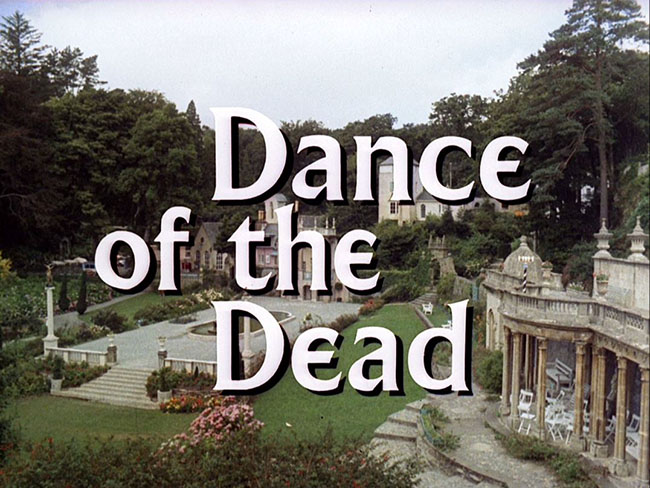
DANCE OF THE DEAD First UK Broadcast: November 17, 1967 [episode #8 in transmission order] | Written by Anthony Skene | Directed by Don Chaffey
SYNOPSIS
The nights of No.6 are spent undergoing extreme experiments on his mind by a doctor in the Hospital, No.40 (Duncan Macrae), with the goal of extracting the reason for his resignation. But the new No.2 (Mary Morris) wants to take a more subtle approach. She makes preparations for a costume-themed Carnival at the Town Hall and encourages No.6 to pick a date. He ignores her suggestions and settles on a young woman, No. 240 (Norma West), who has actually been assigned as his “observer” and feels her cover is blown. No.6 also forms a bond with a stray black cat. One day he discovers a dead body washed up on the beach with a small radio in his pocket. No.6 steals the radio and listens to transmissions in different languages, but his observer and No.2 catch him with it. Later he sends the body off in a life preserver, bundling with it information about the Village – including his own hand-drawn map and his ID card – hoping that it will lead to rescue. Just as he shoves the body off, he discovers his old friend Roland Walter Dutton (Alan White), who has been held prisoner in the Village for much longer than No.6, and has been given 72 hours’ freedom for a chance to reconsider a chance for peaceful conformity in the Village before he “ceases to exist.” No.6 attends the Carnival dressed in the costume given him by No.2 – his own suit. She is dressed as Peter Pan, his maid (Denise Buckley) as Queen Elizabeth, the doctor as Napoleon, his observer as Little Bo Peep, and the town crier (Aubrey Morris of A Clockwork Orange) as a Roman emperor. While sneaking around the Town Hall, No.6 discovers that Dutton has been sentenced to death. No.2 discovers him and escorts him back to the Carnival where she puts him on trial to answer to his nonconformity. The sentence is “death”: the outside world will be given evidence that he died in an accident at sea. Bo Peep testifies against him, and Queen Elizabeth, Napoleon, and the Roman Emperor serve as his judges. No.6 calls as his witness Dutton, but the man brought before him has been reduced to a vegetable and dressed as the Fool, waving a white balloon on a stick. The Prisoner’s identity is processed for termination on a telex machine that continues to function even after he has ripped out its circuitry.
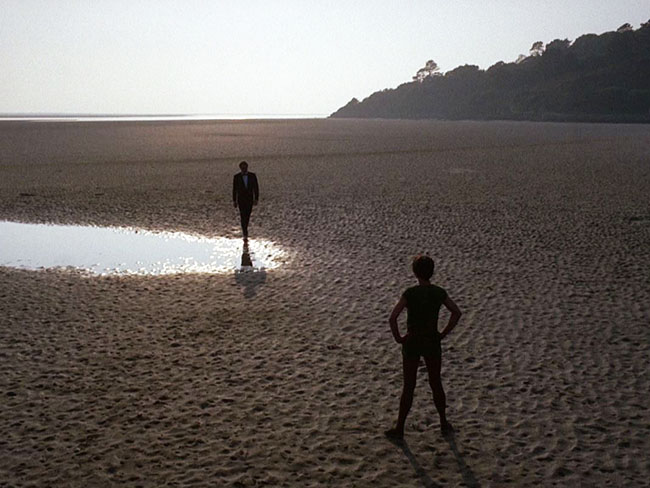
No.6 (Patrick McGoohan) is confronted by Peter Pan and his shadow – or, rather, No.2 (Mary Morris), costumed for Carnival.
OBSERVATIONS
I always find “Dance of the Dead” one of the most pleasurable episodes to watch – which maybe says something about me. It’s downbeat and cynical, featuring a No.6 whose morale is at a low ebb. There is little action and the stakes are mostly abstract. It’s not an episode that most Prisoner fans cite as one of their favorites, but it’s one of mine. There is something in its melancholy tone and increasingly surreal atmosphere that I find mesmerizing; I also appreciate that it is one of the few Prisoner episodes which takes a pause from the usual frantic pace, lingering in the Village (with lots of Portmeirion location shooting), observing its sinister and strange workings. Some of its imagery is quite beautiful, like the sunset walk on the beach where No.6 meets No.2 dressed as Peter Pan, her shadow extending behind her as in a storybook illustration. But “Dance of the Dead” is a downer, completely lacking the usual comic touches. Morris, a distinguished theater veteran with numerous TV credits, makes an excellent No.2, one of the few females to occupy the office in the series’ run. She holds her own with confidence, biding her time before making her move against No.6’s iron will with the revelation of poor Dutton’s fate, and letting No.6 know that he no longer has a life to go back to. Both Dutton and 6 are the “dead” of the title, and this Carnival might as well be the ball from “The Masque of the Red Death.” In The Prisoner, death is losing one’s sense of self. When No.6 asks 2 “Why haven’t I got a costume?” she casually responds, “Perhaps because you don’t exist.” This is her goal: to convince No.6 that the personal identity to which he clings is worthless, because he’s already a dead man walking – as the disabled but still-running computer demonstrates.
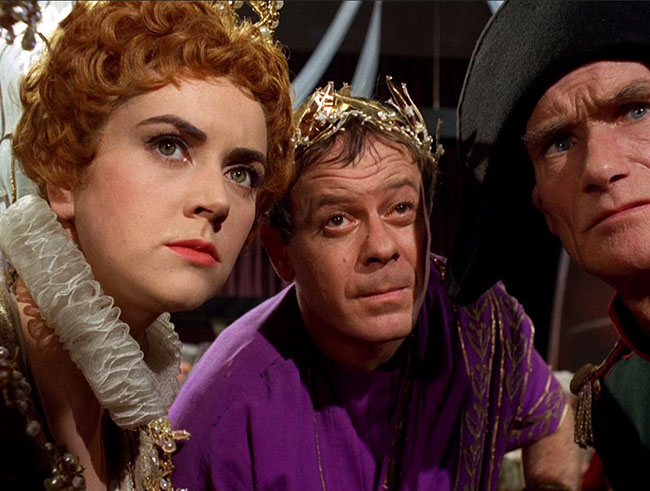
The three judges who hold No.6’s fate: Queen Elizabeth (Denise Buckley), the Emperor (Aubrey Morris), and Napoleon (Duncan Macrae).
SEQUENCE
There are compelling reasons to place this second in episode order, even though I have it at #4. Anthony Skene, who also wrote the classic Prisoner episodes “A. B. & C.” and “Many Happy Returns,” believed he was writing the second episode of the series, but so did the writers of “Free for All” and “Checkmate” (McGoohan and Gerald Kelsey). No.6 announces to his maid, “I’m new here,” so there should be no dispute that it ought to be earlier than its original placement by transmission date (#8). We can check off the arguments to place this episode second: there are discussions of the Village as a democracy, a satirical idea which will be further explored (and pretty definitively concluded) in “Free for All”; No.6 states that he no longer has nights (due to the nocturnal experiments conducted on him by the Hospital), though in “Checkmate” he slinks about after curfew; although No.6 visits the Town Hall in “Free for All,” here it’s given a conspicuous introduction when No.6 is blocked from entering by an invisible force, and a Villager explains to him that the Town Hall “is fussy about who it lets in.” But we can write our own justifications to these arguments. To the last point, it’s possible that No.6 thinks he can just walk into the Town Hall because he’s allowed to do so in “Free for All” (he’s shepherded inside by Rover).
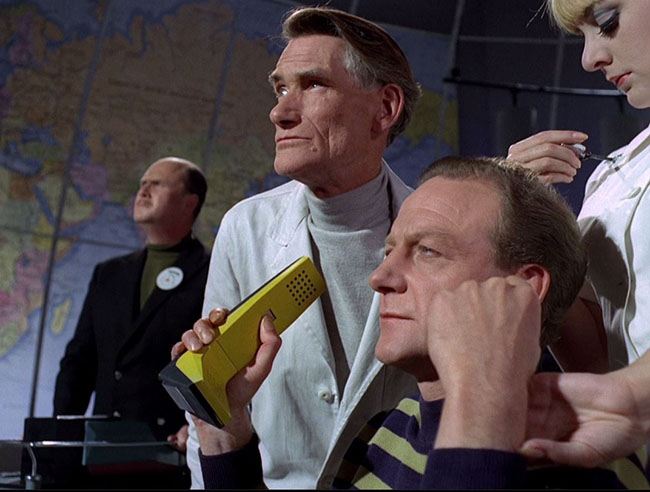
The Doctor (Duncan Macrae) oversees a dangerous experiment on No.6.
But production order might help here; it was fourth to be filmed, and pushed back when McGoohan was dissatisfied by the result. It appears there were some arguments over how the story and various scenes should be handled. McGoohan wanted to remove more intimate scenes between his character and Norma West’s. (As it is, her cleavage-sporting Bo Peep costume remains the sauciest thing in a series which staunch Catholic McGoohan insisted not be sexy.) In Robert Fairclough’s 2002 book The Prisoner, he writes of the original scripted ending: “The story should have ended with the Prisoner acknowledging his death in the outside world, and saying that ‘being dead does have its advantages.’ He would then smash the telex machine with an ash tray, and join in a frantic dance with Bo Peep – requiring more close shots with West – and the rest of the Villagers, making the meaning of the story’s title explicit. This final sequence was never shot; as a result, the original edit under ran by several minutes.” The episode was rescued much later by film editor John S. Smith, who was able to piece together a full hour that pleased McGoohan.
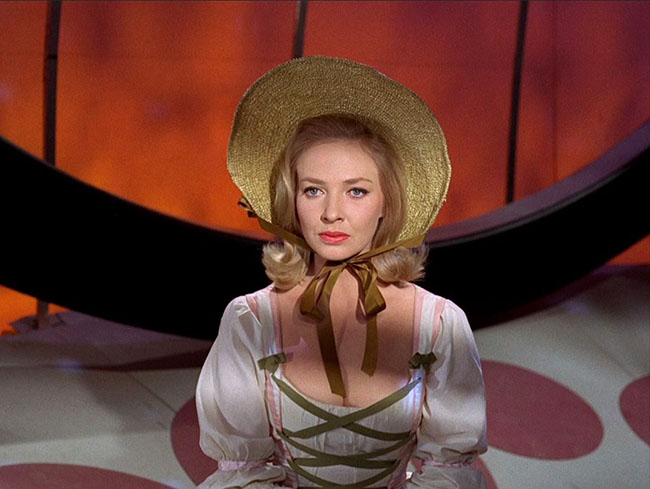
Norma West as No.6’s observer and accuser, Little Bo Peep.
In addition, from a storytelling and pacing perspective, “Dance of the Dead” places well at this point in the series. No.6’s only attempt to escape is essentially a message-in-a-bottle – pretty tepid, considering that No.6 is defined by his aggressive defiance. By placing it after “Checkmate,” we know that No.6 has just made a grand effort to escape, only to see it fall apart. “Dance of the Dead,” then, finds him stewing and taking stock of his situation – he is passive for most of this episode. No.6 mentions that he goes through maids quickly, so it helps to have “Free for All” earlier in the mix, since it also include a temporary maid. Stylistically, the episode is more outlandish than “Checkmate,” something closer to the extremes of “Free for All” – thus, “Checkmate” acts to separate those two episodes so that one doesn’t think The Prisoner is all about surrealism. And there is so little action and conflict in the melancholy “Dance of the Dead” (no fisticuffs at all!) that to place it second gets the series off to an awkward start; it’s possible this is why it was it was pushed to fourth in the production schedule, and possibly another reason why it aired so late.
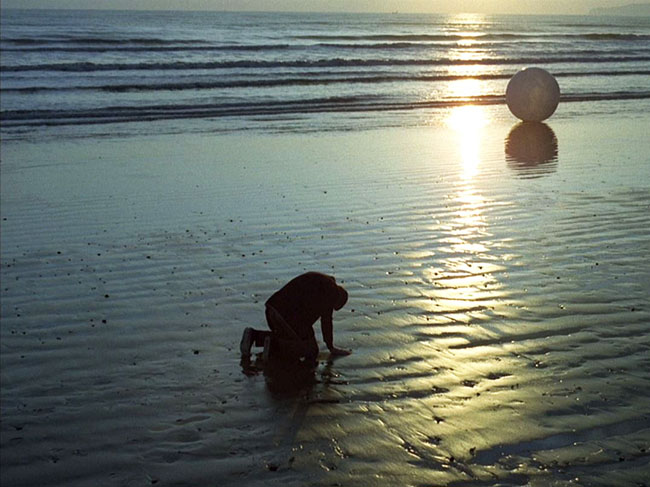
No.6 is outpaced by Rover.
THE VILLAGE
We learn a bit more about the Village, but it only adds to the mystery. No.240, the observer, says, “This place has been going for a long time.” No.6 belligerently replies, “Since the war? Before the war? Which war?” She only answers, “A long time.” We also discover how the legal system works: three judges are assigned a person’s fate. Indeed, the climax of this episode can rate as the strangest courtroom drama to ever air on television.
PROPAGANDA
No.240 repeats a mantra from the Labour Exchange in “Arrival,” “Questions are a burden to others, answers a prison for oneself.”
THE BLACK CAT
The stray cat which No.6 befriends appears in two episodes of the series, both written by Skene; the other is “Many Happy Returns.” His maid, No.54, says, “We’re not allowed animals. It’s a rule.” But later it’s revealed that the cat belongs to No.2. “She works here too,” No.2 says of the cat. “She’s very efficient. Almost ruthless.” No.6 takes this news poorly: “Never trust a woman. Even the four-legged variety.”
METHODOLOGY
The Hospital subjects No.6 to life-threatening treatments nightly, trying to force him to give up his secrets with a crown of electrodes on his head. No.2 disapproves. As stated again and again in the series, No.2 doesn’t want to damage such an important subject. Her method is to attack No.6’s sense of hope. Like the female No.2 at the end of “Free for All,” she is more interested in bringing him low than getting information. After all, we’re still in the early stage of his internment.
WIN OR LOSE?
He loses – again, pretty badly. It will be some time before he can begin to turn the tide…
QUOTES
No 40: I’ll take responsibility. If we wait for orders, we’ll never get results.
No.2: We’re promised a cabaret this year. You’ll come?
No.6: I have a choice?
No.2: You do as you want.
No.6: As long as it is what you want.
No.2: As long as it is what the majority wants. We’re democratic. In some ways.
Town Crier: There will be music, happiness, dancing, all at the Carnival – by order.
No.24, on seeing No.6’s costume is his standard suit: What does that mean?
No.6: That I’m still – myself.
No.240, the Observer, learns of the death of one of the prisoners she’s been assigned to watch: Dead?…I got to know him quite well.
Supervisor: He didn’t know you, did he?
UP NEXT: THE CHIMES OF BIG BEN
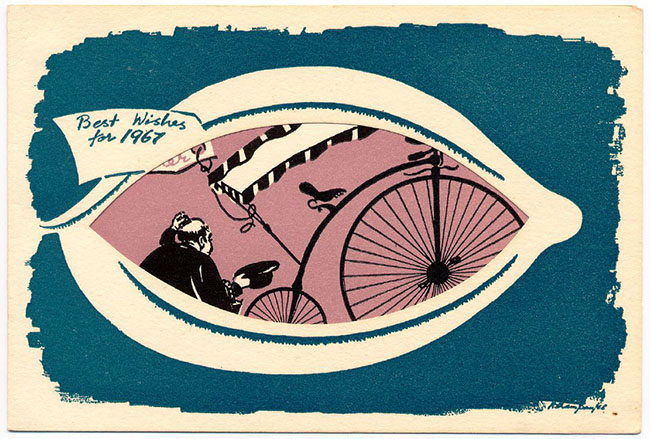
Production Christmas card from 1967.










